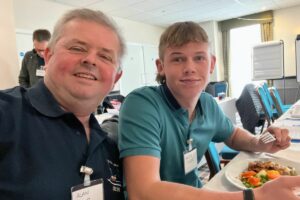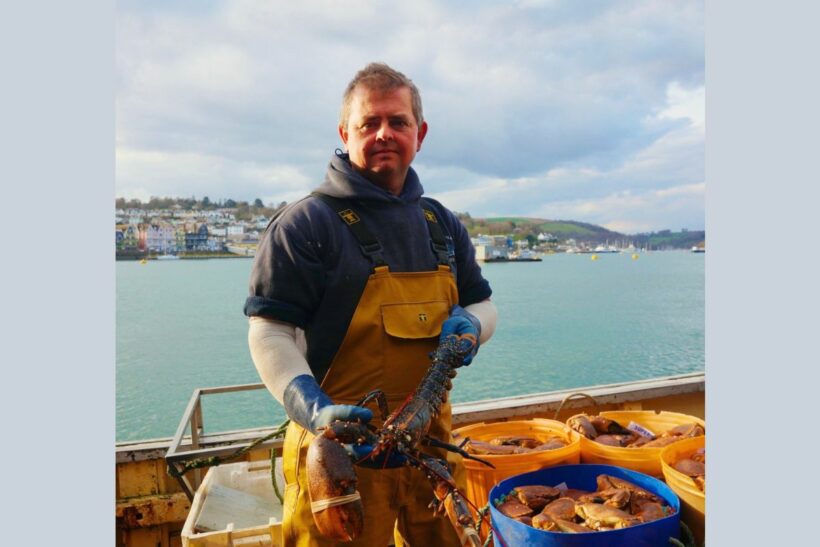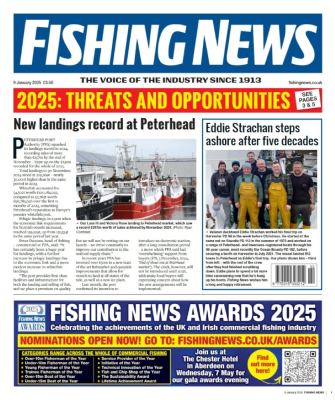One of the things I try and do is to make every day a typical day,” South Devon-based fisherman Alan Steer told Fishing News. “For me, it’s all about consistency.”
A third-generation fisherman from the village of Beesands, Alan’s career began at a young age. “My father and grandfather worked small boats off the beach here at Beesands, with willow pots – fishing around the shore for crab and lobster. Ever since I was old enough to walk and talk, I’ve been going out with Dad on the boat doing pots – so fishing has always been in the blood.”
On leaving school, Alan enrolled in a Youth Training Scheme for fishermen based in Falmouth, Cornwall, whilst continuing to learn his trade working with his father Winkie. “I worked with Dad on the boat for pretty much 10 years, mainly potting, but we also did some trawling, netting – a bit of everything, really, in the early days. As regulations tightened, we gradually moved over to more just crabbing. “
In 1997, when I was 27, I got married – and my father pretty much retired, and gave me the boat to run. That was when I started taking it on my own and doing things for myself.”
That vessel was the 1964-built potter Superb-Us DH 99, which Alan still works, fishing out of Dartmouth and targeting mainly brown crab.
Routine is key to how he runs his fishing business. “Crew these days need some sort of stability. That was always a problem when I was growing up. My father would ring me and say we’d be going now, or we’re not going until later – and that never really worked. For crew, I think that’s a real problem.
“So consistency is something I’ve tried to put into our days. Our season normally runs from May until Christmas, with our main months being May, June and July. We try to work five to six days a week through those months, and then drop back to four days a week when it’s not quite so good fishing.
“My alarm goes off at 2.45am every morning. I leave the house at 3.05am, drive to Dartmouth in the truck, and normally pick up the crew at around 3.30am. We’re then on the boat for 3.45am.
“By the time the boat’s ready, we’re hoping to be slipping the moorings at 4am. That’s our general process for getting out of the harbour.”
Once out, Alan and his crew of two – one of whom is 18-year-old son Alfie – turn their attention to hauling.
“We’ve got three sets of gear we work. They’re all about 600 pots each. How far we steam depends on which set we’re going to – generally, it’s between 40 minutes and an hour and a half.
“We’re normally hauling by 5am. Most of our pots are in strings of 60. We have got some strings up on the Skerries Bank – that’s the exception, really. That’s not such a long steam. We work short strings of between 25 to 40 pots there because of the ground.”
Alan is very much a hands-on skipper. “I’m out on deck all of the time with the crew. Even when we’re hauling, I’m working the winch. The crew alternate between lifting the pots in, and baiting and stacking them. Each string, they’ll swap round.”

Alan with 18-year-old son Alfie, who is following in his father’s footsteps – gaining invaluable local knowledge at sea, whilst undertaking a fishing apprenticeship at South Devon College.
With hauling usually complete by 2pm, Alan heads for Dartmouth and begins preparing to land. “All the crab gets put behind the wheelhouse underneath a wet hose.
“The crew nick up the male crabs, because they go to a ifferent market – they’re London-bound. The hen crabs are then dragged up and sorted, along with any spider crab. We don’t have to nick the crab we land to Blue Sea Food Company – they just go straight into bins and onto the lorry. The crew will then start washing down, tidying up and taking care of any pot maintenance.
“On the steam back, I’ll also do all of the paperwork on the e-log – with another of my duties on the way home being to put the kettle on. We’re usually up the harbour by 3pm to land for the lorry, and by the time I’ve put the boat to bed and dropped the crew off, I’m usually home sometime before 4pm.”
An ongoing task is to pass on his knowledge, experience and skills to his young apprentice – son Alfie. “He started with us last year on the boat. He’s doing a fishermen’s apprenticeship at South Devon College, which has been good for him.
“My father taught me a lot of locally-based information – which is invaluable – but there’s a whole lot of wider things you learn at college. That’s really good for moving forward on your own later in life – and I think that’s a really good start for Alfie.
“He’s doing really well. He reminds me of me when I was his age. It’s a way of life down here where we live – it’s not so much a job, but something you enjoy.”
This story was taken from the latest issue of Fishing News. For more up-to-date and in-depth reports on the UK and Irish commercial fishing sector, subscribe to Fishing News here or buy the latest single issue for just £3.50 here.
Sign up to Fishing News’ FREE e-newsletter here.





